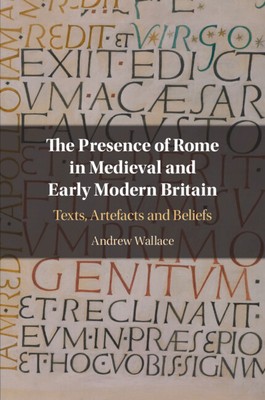
- We will send in 10–14 business days.
- Author: Andrew Wallace
- Publisher: Cambridge University Press
- ISBN-10: 1108791433
- ISBN-13: 9781108791434
- Format: 15.2 x 22.9 x 1.4 cm, minkšti viršeliai
- Language: English
- SAVE -10% with code: EXTRA
The Presence of Rome in Medieval and Early Modern Britain (e-book) (used book) | bookbook.eu
Reviews
Description
This book explores the cultural and intellectual stakes of medieval and renaissance Britain's sense of itself as living in the shadow of Rome: a city whose name could designate the ancient, fallen, quintessentially human power that had conquered and colonized Britain, and also the alternately sanctified and demonized Roman Church. Wallace takes medieval texts in a range of languages (including Latin, medieval Welsh, Old English and Old French) and places them in conversation with early modern English and humanistic Latin texts (including works by Gildas, Bede, Chaucer, Shakespeare, Bacon, St. Augustine, Dante, Erasmus, Luther and Montaigne). 'The Ordinary', 'The Self', 'The Word', and 'The Dead' are taken as compass points by which individuals lived out their orientations to, and against, Rome, isolating important dimensions of Rome's enduring ability to shape and complicate the effort to come to terms with the nature of self and the structure of human community.
EXTRA 10 % discount with code: EXTRA
The promotion ends in 23d.02:57:20
The discount code is valid when purchasing from 10 €. Discounts do not stack.
- Author: Andrew Wallace
- Publisher: Cambridge University Press
- ISBN-10: 1108791433
- ISBN-13: 9781108791434
- Format: 15.2 x 22.9 x 1.4 cm, minkšti viršeliai
- Language: English English
This book explores the cultural and intellectual stakes of medieval and renaissance Britain's sense of itself as living in the shadow of Rome: a city whose name could designate the ancient, fallen, quintessentially human power that had conquered and colonized Britain, and also the alternately sanctified and demonized Roman Church. Wallace takes medieval texts in a range of languages (including Latin, medieval Welsh, Old English and Old French) and places them in conversation with early modern English and humanistic Latin texts (including works by Gildas, Bede, Chaucer, Shakespeare, Bacon, St. Augustine, Dante, Erasmus, Luther and Montaigne). 'The Ordinary', 'The Self', 'The Word', and 'The Dead' are taken as compass points by which individuals lived out their orientations to, and against, Rome, isolating important dimensions of Rome's enduring ability to shape and complicate the effort to come to terms with the nature of self and the structure of human community.


Reviews